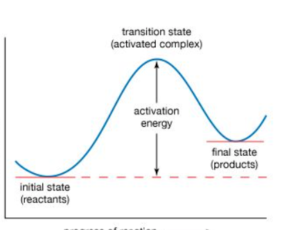I study chemistry, and I see a correlation between a chemistry concept and walking through a struggle in depression. In a chemical reaction, there is something called the “energy of activation.” It is the energy that is necessary for a reaction to proceed. In the diagram below, is the large hump or hill between the initial state and the final state. So if I relate that to depression, it is the struggle that I go through to perform a particular task. Now, I’ve realized it’s not about the task. For example, it does not matter if the task I’m trying to achieve is getting out of bed, going to a meeting, going to work, going to the gym, or achieving a lofty goal. It’s about the energy of activation, or the difficulty of the struggle that matters. When I am in severe depression, the energy of activation required for me to get out of bed is immense. It may feel impossible at times! Now that I am not in a depression, that task is not a struggle for me. It has a low activation energy. In other words, it’s easy for me at this time.
So why does this matter? Because I used to (and still can) compare myself to others and ask myself the question “how does that person do this or that so easily? How come it’s so hard for me to get out of bed but so easy for someone else?” This concept of activation energy helps me realize that everyone has struggles. And if I focus on how to get through the struggle, then I am focusing on the solution. I also realize that at different points in my life, the activation energy for the same task can be VERY different. This also tells me that I can and should give myself credit for getting through the struggle, no matter what the task is!! Because what matters is getting over that hump.
So how do we do that? It boils down to our thinking, doesn’t it? If I feed myself positive thoughts, such as “this is possible,” “I can do it,” “I’ve had successes is the past, so I can do it again,” “I am capable and I am worth it,” then I’m going to get into action and take baby steps up the hill. But if I think negative thoughts (or choose to stay with those negative thoughts, since in my case my default thinking is negative) then I am going to walk myself right down that hill and stay stuck at the bottom. Sometimes I need to think positive thoughts that will get me to call someone else and ask for help or motivation. It’s okay to get help – it’s easier to climb that hill together!
I’m realizing that when I focus on giving myself credit for overcoming that struggle, then I’m helping myself. If I tell myself, “oh, it’s no big deal. All I did was get out of bed today. That doesn’t really count as a success,” then not only am I saddening myself, but I’m also being dishonest with myself!! Because overcoming the energy of activation for that task was critical and a major achievement!! And best of all, at the end of the task, I’m in a better place than where I started. So just for today, I am going to give myself credit for walking though the struggle – no matter how big or small the task.


